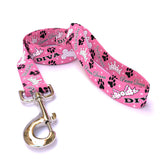What Is Kennel Cough And How Do I Fix It?
Kennel Cough: Symptoms and Treatment
If your dog is coughing a lot,seems tired, and won't eat much they may have Kennel Cough. Here are some quick tips on treatment:
- First, you should always seek the help of your veterinarian if you are concerned with the health of your dog
- Most dogs can fend off Kennel Cough in 2-3 weeks on their own without medication
- If your dog is elderly, a puppy, or has other conditions then they may need antibiotics, so GO TO YOUR VET
- Keep your dog away from other dogs while they display symptoms
- Try switching to soft foods if their appetite is diminished
And here's a more detailed explanation of what exactly Kennel Cough is, and how to treat it.
If you research kennel cough on the Internet, glancing at animal care
forums, you'll find people have various opinions. Some panic at the idea of
their dogs becoming infected, while others seem less concerned. Even veterinary
advice can conflict, so how serious is your dog's cough, and what can you do to
help?
Symptoms

Dogs cough for a variety of reasons; sometimes it indicates more severe
illnesses than kennel cough, such as heart trouble. Symptoms of kennel cough,
however, are distinctive. The sound made by infected dogs is much like choking
or honking. Small dogs can also make a sound like a reverse sneeze. The illness
can begin two to 10 days before you notice symptoms.
Coughing may occur every few minutes or occasionally, and it will worsen
with exertion, stress, excitement, and when your dog pulls on the lead. Most
coughs are unproductive, but sometimes, foamy white phlegm is produced.
Although appetite usually isn't weakened, your dog might be tired
and won't feel like eating too much. Your pooch will also have a sore throat
and might have watery eyes.
The ailment is spread much like colds in humans. Coughing, sneezing, or
sharing utensils will spread the infection, which is mostly airborne or caught
via saliva. The bacterium
Bordetella
bronchiseptica
, microbes, and viruses play their part in most cases.
However, it's now recognized that various bacteria can be to blame. Once your
dog builds a resistance by fending off the condition, he is less likely to get
the same strain again, but he might catch a different strain.
What to do
If you don't know whether your dog has kennel cough, get your
veterinarian to examine him. However, call in advance and ask for him to be
looked at in your car rather than inside the clinic. Kennel cough is highly
infectious, so you don't want to contaminate other dogs.

Most dogs fight the condition on their own without medication. Only
vulnerable dogs or those with a secondary illness may need professional help,
including elderly or young dogs, or those with a compromised immune system.
Your dog may also need help if he isn't getting better, or gets worse. Symptoms
usually go after about two or three weeks in previously healthy dogs.
Nonetheless, your dog may be infectious, but symptom-free, for months.
Professionals often advise owners to keep their dogs away from others for seven
to 14 days after symptoms subside, however, as a general guide.
Many professionals don't like to provide unnecessary medications and
know overuse of antibiotics can create resistance to their use later. Some
veterinarians give antibiotics freely, telling dog owners it will shorten
infections. If your dog is vulnerable or has severe symptoms, such medication
might be wise.
If your dog's symptoms match those of kennel cough, your first response
should be to isolate him. Keep him away from other family dogs to avoid their
exposure to the virus, and stop taking him to places other dogs visit.
He will still need exercise, but should be restricted to the garden
or backyard if possible. Too much bouncing and running may bring on a coughing
attack, so encourage him to calm down.
As his throat is inflamed, swallowing might be uncomfortable, and he may
prefer soft foods. Chicken soup tends to go down well, and a teaspoon of
coconut oil will soothe his throat. Ensure his diet is healthy to build his
immune system and provide plenty of fresh water.
You can also help your dog by letting him inhale steam to loosen mucus.
The best way is to have him rest in the bathroom while you run the shower or
bath. If you create steam in the tub, sprinkle a few drops of lavender or tea
tree essential oil in the water. Your dog will enjoy their healing properties.
Take care to keep him away from scalding water.
Kennel cough is uncomfortable for the dog, and the cough sounds severe,
but it's usually not serious. Most dogs can fend off the ailment without
medical assistance. While he's ill, feed him a nutritious diet, let him inhale
steam, and don't get him overexcited. Remember to keep him away from other
dogs, so the illness doesn't spread. If your dog is vulnerable, or if you feel
his condition is intense, getting worse, or not getting better, a visit to your
veterinarian is probably in order.



